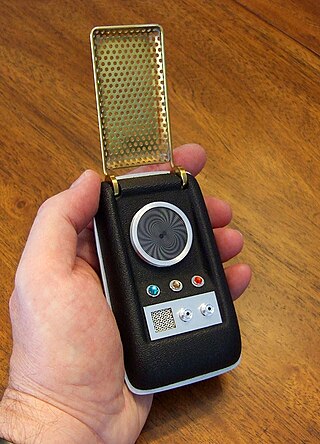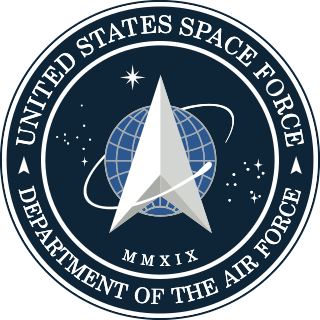| Space Force Delta | |
|---|---|
 | |
| Adopted | 22 July 2020 |
The Space Force Delta is the official logo of the U.S. Space Force, the space warfare service branch of the U.S. Armed Forces. The delta itself was unveiled on 22 July 2020.
| Space Force Delta | |
|---|---|
 | |
| Adopted | 22 July 2020 |
The Space Force Delta is the official logo of the U.S. Space Force, the space warfare service branch of the U.S. Armed Forces. The delta itself was unveiled on 22 July 2020.
The Space Force Delta was officially unveiled by the Senior Enlisted Advisor of the Space Force, CMSgt Roger A. Towberman on 22 July 2020, alongside the Space Force's motto Semper Supra, which translates to "Always Above". The delta symbol has a strong historical tradition in the Space Force, being first used by military space units in 1961 and also being used to identify the second highest echelon of Space Force units, as well as holding a central position in the Space Operations Badge, Space Force seal, and Space Force flag. [2] [3]
The seal and delta quickly gained social media notoriety, as individuals compared it to the seal of Starfleet from Star Trek ; however, the Space Force refuted the notion, stating that the central delta insignia was first used in 1942 by the United States Army Air Forces, and then adopted by the Air Force's early space program in 1961, years before Star Trek debuted in 1966. A number of military commentators noted that it was likely that Star Trek derived its logo from Air Force Space Command, rather than the other way around. [4]
Starfleet is a fictional organization in the Star Trek media franchise. Within this fictional universe, Starfleet is a uniformed space force maintained by the United Federation of Planets as the principal means for conducting deep space exploration, research, defense, peacekeeping, and diplomacy. While most of Starfleet's members are human and it has been headquartered on Earth, hundreds of other species are also represented. Most of the franchise's protagonists are Starfleet commissioned officers.

United States Space Command is a unified combatant command of the United States Department of Defense, responsible for military operations in outer space, specifically all operations 100 kilometers and greater above mean sea level. U.S. Space Command is responsible for the operational employment of space forces that are provided by the uniformed services of the Department of Defense.

The communicator is a fictional device used for voice communication in the fictional universe of Star Trek. As seen in at least two instances, the Original Series episodes "Tomorrow Is Yesterday" and "Day of the Dove," it can also serve as an emergency signaling device/beacon, similar to a transponder. The communicator allows direct contact between individuals or via a ship's communication system.
Ad astra is a Latin phrase meaning "to the stars". The phrase has origins with Virgil, who wrote in his Aeneid: "sic itur ad astra" and "opta ardua pennis astra sequi". Another origin is Seneca the Younger, who wrote in Hercules: "non est ad astra mollis e terris via".

The NASA has three official insignia, although the one with stylized red curved text was retired from official use from May 22, 1992, until April 3, 2020, when it was reinstated as a secondary logo. The three logos include the NASA insignia, the NASA logotype, and the NASA seal.

The United States Air Force Symbol is the public logo of the United States Air Force. It was unveiled in January 2000 following a period of research and planning, and became official on May 5, 2004, four years after the Air Force first applied for trademark protection. The Air Force also released guidelines on appropriate uses for the new symbol.

The Eagle, Globe, and Anchor is the official emblem and insignia of the United States Marine Corps. The current emblem traces its roots in the designs and ornaments of the early Continental Marines as well as the United Kingdom's Royal Marines. The present emblem, adopted in 1955, differs from the emblem of 1868 only by a change in the eagle. Before that time many devices, ornaments, ribbons, and distinguishing marks followed one another as official badges of the corps.
Star Trek uniforms are costumes worn by actors portraying personnel of a fictitious Starfleet in various television series and films in the Star Trek science fiction franchise. During the various series, the costume design has often changed to represent different time periods and for reasons of appearance and comfort. Sometimes different styles were deliberately mixed to enhance the sense of time travel or alternative universes.

In addition to the three official Chaplain Corps seals for the army, navy, and air force, chaplaincies also have special seals and emblems for special schools and organizations for their chaplains, as well as a shared emblem for the "Armed Forces Chaplaincy Center" (AFCC), Fort Jackson, Columbia, South Carolina, where chaplains from all branches of the military receive their training. The original AFCC emblem had three symbols traditionally associated with learning and wisdom—a lamp, a torch and a book. A second emblem was developed by the Commandants and Commanding Officer of the three schools, in part so that it could be used on the reverse side of a two-sided AFCC challenge coin, with one symbol drawn from each of the army, navy, and Chaplain Corps emblems: a dove from the army emblem, cupped hands from the air force emblem, and an anchor from the navy emblem. In addition to using both emblems on the two sides of the AFCC coin, both designs were displayed in the AFCC lobby.

The United States Space Force (USSF) is the United States Armed Forces' space service and one of the eight uniformed services of the United States. It is one of two independent space forces in the world.

Space Operations Command (SpOC) is the United States Space Force's space operations, cyber operations, and intelligence field command. Headquartered at Peterson Space Force Base, Colorado, it consists of its mission deltas, and garrison commands.
United States Space Force rank insignia are used to indicate the rank and status of the United States Space Force officers and enlisted personnel. Equivalency between the military services is indicated by associated NATO code and pay grade.

The Seal of the United States Space Force is the official seal of the U.S. Space Force, the space service branch of the U.S. Armed Forces. The seal itself was approved on 15 January 2020.

The chief master sergeant of the Space Force (CMSSF) is the senior enlisted advisor to the chief of space operations and the secretary of the Air Force. The chief master sergeant of the Space Force is the most senior enlisted guardian in the U.S. Space Force, unless an enlisted guardian is serving as the senior enlisted advisor to the chairman.

The flag of the United States Space Force is the flag used to represent the U.S. Space Force and its subsidiary units and formations. It was officially unveiled on May 15, 2020.

Space Training and Readiness Command is the United States Space Force's education, training, doctrine, and test field command. It is headquartered at Peterson Space Force Base, Colorado.
Comparison of ranks and insignia of all current and former space forces, to include aerospace forces and air and space forces or air forces with space units and formations.
"Semper Supra" is the official march of the United States Space Force, composed in 2022 by James Teachenor and Sean Nelson.